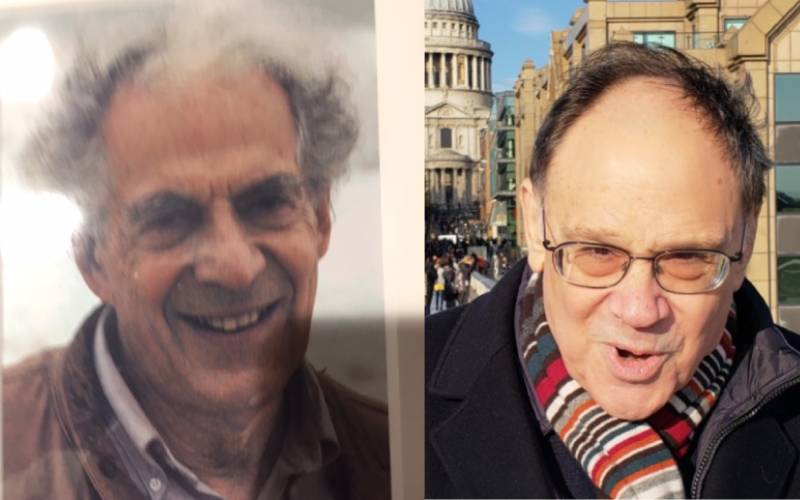“A big part of my graduate education at Harvard was critical thinking. The general idea that theories come and go, even the data come and go because it’s modified as new experimental paradigms that develop. So the idea of fixity. that “now we now know and it’s set in stone”, was not at all in my thinking by the time I left Graduate School if it ever had been.“

Fred Pine, PhD and Joel Whitebook, PhD
New York
Episode Description:
Guest host, Dr. Joel Whitebook, interviews another elder from our field, Dr. Fred Pine. A discussion of the history of Dr. Pine’s long and rich career is not only fascinating in its own right, but it also raises an important question: what combination of character traits and personal experience allows one to become an independent thinker? Dr. Whitebook also invites Dr. Pine to explain his basic theoretical approach which is both clinical and developmental. When he observes a phenomenon in an adult patient, Dr. Pine asks “what can we hypothesize about the person’s development so that it would have produced the phenomenon in question?” And when he observes a developmental phenomenon, he asks the opposite question “what sort of adaptive and pathological phenomena might we expect to result from it in the person’s later life?” It was through this use of a clinical/developmental approach that Dr. Pine was able to introduce many important innovations in our field.
Our Guest:
Dr. Fred Pine is a Professor Emeritus in psychiatry at the Albert Einstein College of Medicine. In 1956, he received his Ph.D. from Harvard University’s Social Relations Program, where he studied with such eminent scholars as Henry Murray, Gordon Allport, Clyde Kluckhorn, and Talcott Parsons. After working for six years at the NYU Research Center for Mental Health, Dr. Pine did his psychoanalytic training at The New York Psychoanalytic Institute. In addition to his own extensive contributions to the literature, Dr. Pine was also a co-author of a psychoanalytic classic, The Psychological Birth of the Infant.
Mentioned in This Episode
IPA Off the Couch – www.ipaoffthecouch.org
Recommended Readings
Pine, F. (1979). On the Pathology of the Separation-Individuation Process as Manifested in Later Clinical Work: An Attempt at Delineation. Int. J. Psychoanal. 60: 226-242.
Pine, F. (1993). A Contribution to the Analysis of the Psychoanalytic Process. Psychoanal Quarterly. 62: 185-205, 1993.
Pine, F. (2004). Mahler’s Concepts of “Symbiosis” and “Separation-Individuation”: Revisited, Reevaluated, Refined. Journal of the American Psychoanalytic Association. 52: 511-533.
Pine, F. (2006). If I Knew Then What I Know Now: Theme and Variations. Psychoanalytic Psychology. 23:1-7.
Pine, F. (2011). Beyond Pluralism: Psychoanalysis and the Workings of Mind. Psychoanalytic Quarterly. 80: 823-856.
Pine, F. (2005). Theories of Motivation in Psychoanalysis. In: A Textbook of Psychoanalysis. Eds. Person, E. S., Cooper, A., and Gabbard, G. Washington, D.C.:American Psychiatric Assoc. Press, pp. 3-19.
Pine, F. (1998) Chapter 5. The ego in the session. In: Diversity and Direction in Psychoanalytic Technique. New Haven: Yale Univ. Press

Eu fico abismado que ideias como destes autores ficaram sem encontrar espaço na divulgação nos meios psicanaliticos. Compreendo que a força do paradigmas estsbelecido pelos seguidores de Freud nao que dominara a IPA nao podiam aceitar tais ideias. Sabemos o que ocorreu com idrias como de Melanie Klei n, Lacan , Bion tantos outos até serem aceitos. Espero que a IPA e suas instituições espalhadas no mundo, se abram abram definitivamente.
I am astonished that ideas like these authors were left without finding space in the dissemination in psychoanalytic media. I understand that the strength of the paradigm is established by the followers of Freud, not that he had dominated the IPA, they could not accept such ideas. We know what happened to ideas like Melanie Klein, Lacan, Bion, and so many others until they were accepted. I hope that the IPA and its institutions around the world will open up definitively.